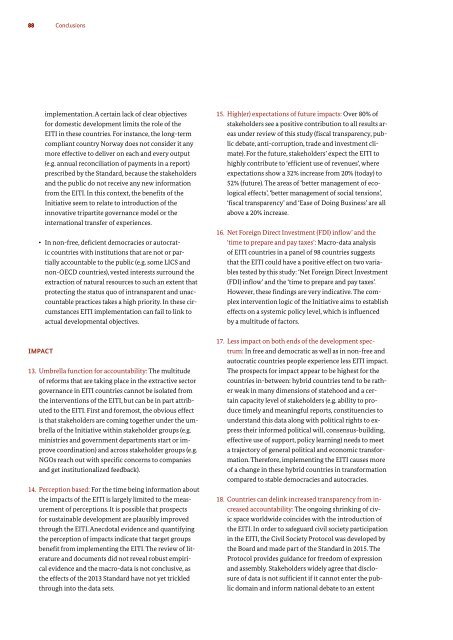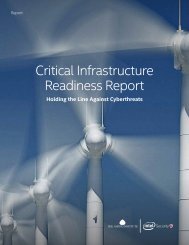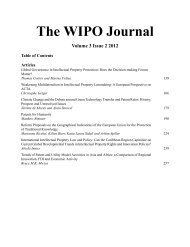Transparency Initiative (EITI)
2eoch1l
2eoch1l
Create successful ePaper yourself
Turn your PDF publications into a flip-book with our unique Google optimized e-Paper software.
88 Conclusions<br />
implementation. A certain lack of clear objectives<br />
for domestic development limits the role of the<br />
<strong>EITI</strong> in these countries. For instance, the long-term<br />
compliant country Norway does not consider it any<br />
more effective to deliver on each and every output<br />
(e.g. annual reconciliation of payments in a report)<br />
prescribed by the Standard, because the stakeholders<br />
and the public do not receive any new information<br />
from the <strong>EITI</strong>. In this context, the benefits of the<br />
<strong>Initiative</strong> seem to relate to introduction of the<br />
innovative tripartite governance model or the<br />
international transfer of experiences.<br />
• In non-free, deficient democracies or autocratic<br />
countries with institutions that are not or partially<br />
accountable to the public (e.g. some LICS and<br />
non-OECD countries), vested interests surround the<br />
extraction of natural resources to such an extent that<br />
protecting the status quo of intransparent and unaccountable<br />
practices takes a high priority. In these circumstances<br />
<strong>EITI</strong> implementation can fail to link to<br />
actual developmental objectives.<br />
IMPACT<br />
13. Umbrella function for accountability: The multitude<br />
of reforms that are taking place in the extractive sector<br />
governance in <strong>EITI</strong> countries cannot be isolated from<br />
the interventions of the <strong>EITI</strong>, but can be in part attributed<br />
to the <strong>EITI</strong>. First and foremost, the obvious effect<br />
is that stakeholders are coming together under the umbrella<br />
of the <strong>Initiative</strong> within stakeholder groups (e.g.<br />
ministries and government departments start or improve<br />
coordination) and across stakeholder groups (e.g.<br />
NGOs reach out with specific concerns to companies<br />
and get institutionalized feedback).<br />
14. Perception based: For the time being information about<br />
the impacts of the <strong>EITI</strong> is largely limited to the measurement<br />
of perceptions. It is possible that prospects<br />
for sustainable development are plausibly improved<br />
through the <strong>EITI</strong>. Anecdotal evidence and quantifying<br />
the perception of impacts indicate that target groups<br />
benefit from implementing the <strong>EITI</strong>. The review of literature<br />
and documents did not reveal robust empirical<br />
evidence and the macro-data is not conclusive, as<br />
the effects of the 2013 Standard have not yet trickled<br />
through into the data sets.<br />
15. High(er) expectations of future impacts: Over 80% of<br />
stakeholders see a positive contribution to all results areas<br />
under review of this study (fiscal transparency, public<br />
debate, anti-corruption, trade and investment climate).<br />
For the future, stakeholders’ expect the <strong>EITI</strong> to<br />
highly contribute to ‘efficient use of revenues’, where<br />
expectations show a 32% increase from 20% (today) to<br />
52% (future). The areas of ‘better management of ecological<br />
effects’, ‘better management of social tensions’,<br />
‘fiscal transparency’ and ‘Ease of Doing Business’ are all<br />
above a 20% increase.<br />
16. Net Foreign Direct Investment (FDI) inflow’ and the<br />
‘time to prepare and pay taxes’: Macro-data analysis<br />
of <strong>EITI</strong> countries in a panel of 98 countries suggests<br />
that the <strong>EITI</strong> could have a positive effect on two variables<br />
tested by this study: ‘Net Foreign Direct Investment<br />
(FDI) inflow’ and the ‘time to prepare and pay taxes’.<br />
However, these findings are very indicative. The complex<br />
intervention logic of the <strong>Initiative</strong> aims to establish<br />
effects on a systemic policy level, which is influenced<br />
by a multitude of factors.<br />
17. Less impact on both ends of the development spectrum:<br />
In free and democratic as well as in non-free and<br />
autocratic countries people experience less <strong>EITI</strong> impact.<br />
The prospects for impact appear to be highest for the<br />
countries in-between: hybrid countries tend to be rather<br />
weak in many dimensions of statehood and a certain<br />
capacity level of stakeholders (e.g. ability to produce<br />
timely and meaningful reports, constituencies to<br />
understand this data along with political rights to express<br />
their informed political will, consensus-building,<br />
effective use of support, policy learning) needs to meet<br />
a trajectory of general political and economic transformation.<br />
Therefore, implementing the <strong>EITI</strong> causes more<br />
of a change in these hybrid countries in transformation<br />
compared to stable democracies and autocracies.<br />
18. Countries can delink increased transparency from increased<br />
accountability: The ongoing shrinking of civic<br />
space worldwide coincides with the introduction of<br />
the <strong>EITI</strong>. In order to safeguard civil society participation<br />
in the <strong>EITI</strong>, the Civil Society Protocol was developed by<br />
the Board and made part of the Standard in 2015. The<br />
Protocol provides guidance for freedom of expression<br />
and assembly. Stakeholders widely agree that disclosure<br />
of data is not sufficient if it cannot enter the public<br />
domain and inform national debate to an extent









